Speed matters when it comes to spotting antibiotic-resistant bacteria in the blood – the sooner these superbugs can be found, the sooner doctors can prescribe the correct treatment.
As well as significantly improving outlooks for patients and limiting the spread of these bugs, a faster diagnosis also means less time wasted on antibiotics that aren’t going to be effective.
At the moment the quickest superbug diagnosis time is around 24 hours. Now new research has identified a way of completing the whole blood sampling and analysis process in the space of just one hour.
“That was always our goal, to do it in an hour,” says electrical and computer engineer Aaron Hawkins from Brigham Young University in the UK.
“It’s quite exciting that we’ve been able to combine all of our efforts and hit that benchmark.”
Researchers from across the fields of molecular biology, chemistry, integrated optics and chemical processing put their heads together to come up with the new process, which can look out for three different superbugs in one go.
Through a process of blood spinning, the bacteria are isolated from the samples so their DNA can be analysed. The researchers used fluorescent molecules designed to bind specifically to segments of bacterial DNA that contain known antibiotic resistant genes. If these genes were present in the sample, they could then be detected by a microchip.
There’s innovation all along the pipeline too – from the way the blood is separated, to the optical detection method on the chip that enables several different types of antibiotic-resistant bacteria to be spotted (known as multiplexing).
“Once you’re trying to diagnose the disease, the clock is ticking,” says Hawkins.
“Every hour the disease is untreated, survivability drops by about 7 percent. You want to know what you’re fighting immediately so you can apply the right treatments.”
When every hour is crucial, saving at least 23 of them is a major step forward for diagnostic efforts. After five years of research, the team is now working with a start-up company to distribute the chips, which measure 1 centimetre (0.4 inches) square.
Superbugs have increasingly been evolving to withstand the best drugs we can throw at them, and they’re a growing concern for scientists. It’s a question of whether they can adapt to our treatments faster than we can adapt the treatments.
The new microchip blood test is a brand new solution to a problem that’s been around for millions of years, and while it doesn’t tackle the superbugs directly, it does mean they can be spotted and attacked much earlier on.
“These results point the way towards rapid, amplification-free, multiplex analysis of antibiotic-resistant pathogens,” write the researchers in their published paper.
The research has been published in Lab on a Chip.



